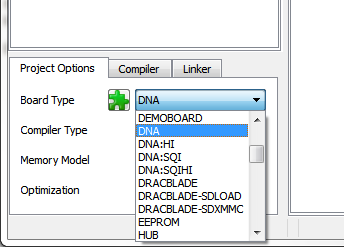Propgcc-win
PropellerGCC & SimpleIDE for Windows
Currently all of the SimpleIDE examples will execute on the DNA using the default board configuration included in each example. If Flash or MicroSD support is needed see the next section. Please be aware that both Propeller GCC and SimpleIDE are currently in early beta. The information here is subject to change.
Using Flash & uSD in SimpleIDE

If your application uses a MicroSD card (and/or the Flash memory in U9) you need to tell SimpleIDE which set of Propeller pins are connected to the MicroSD socket. You do this by selecting one of the DNA entries in the "Board Type" selector in the lower left quadrant of the SimpleIDE window as shown above.
Using the following Board Types in SimpleIDE will automatically load "spi_flash_cache.dat" which is a PropellerGCC driver that will run large C/C++ programs from most standard SPI capable memory. The Winbond flash memory supplied with the DNA-RTC can be plugged into U9 to use this mode. This allows up to 1 megabyte C/C++ programs to be loaded and run from flash. A MicroSD card can be used at the same time to load and store data files, etc.
DNA MicroSD U9 Propeller DO DO → Pin 0 CLK CLK ← Pin 1 DI DI ← Pin 2 /CS ← Pin 3 /CS ← Pin 4
DNA:HI MicroSD U9 Propeller DO DO → Pin 16 CLK CLK ← Pin 17 DI DI ← Pin 18 /CS ← Pin 19 /CS ← Pin 20
The same Winbond flash chip described above is capable of Quad SPI (see datasheet) but the chip must be removed from U9 and plugged into U12 to enable this mode. Using the following Board Types in SimpleIDE will automatically load "winbond_sqi_flash_cache.dat" which is a Quad SPI driver written specifically for the Winbond chip. As before, a MicroSD card can be used at the same time to load and store data and files. (U9 is unused in this mode.)
DNA:SQI MicroSD Propeller DO → Pin 0 CLK ← Pin 1 DI ← Pin 2 /CS ← Pin 3
DNA:SQIHI MicroSD Propeller DO → Pin 16 CLK ← Pin 17 DI ← Pin 18 /CS ← Pin 19